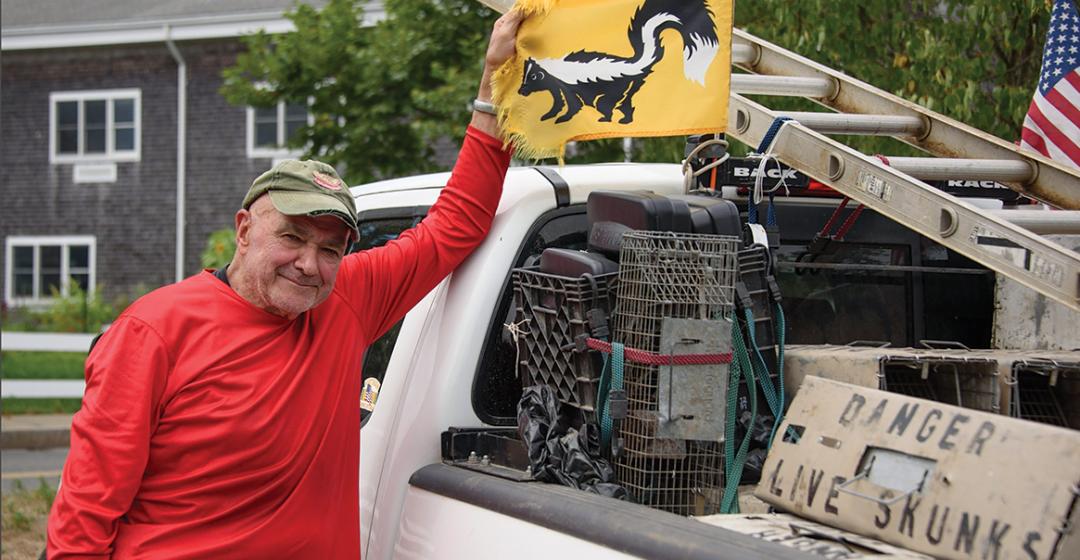Smells, fetid and fragrant. That’s what I want to discuss first with professional skunk remover Walter Wlodyka after getting into his pickup which, not surprisingly, smells faintly of skunks.
“I get sprayed almost once a day,” says Wlodyka, who spends about 300 days a year pursuing Vineyard skunks. There’s also the alluring smell of his skunk bait, a secret recipe that includes peanut butter and a variety of liquids he declines to name. Over Wlodyka’s forty-four-year career, the bait has helped him land an estimated 300,000 skunks. I show him a newspaper article about Le Petit Skunk, a perfume. The perfume’s price: $244 for fifty milliliters. Wlodyka smiles: “Whatever winds your clock.”
In addition to a skunk flag, an American flag waves in the wind from the back of Wlodyka’s truck. He has created a large sticker that he has plastered across the passenger-side window: “The veteran, for we have bourn the cross of war and will carry the cross to the grave.” On Wlodyka’s website, he explains that customers should write their requests, rather than call them in. Tours of Army duty in Vietnam (’70) and Laos (’71) have left him with an injured neck and right rotator cuff and nerve damage in his left hand, making it difficult for him to write down the details of phone calls.
To check his skunk-catching traps, Wlodyka drives almost daily an eighty-to-one-hundred-mile route from his home in Chilmark east on South Road through West Tisbury, Edgartown (sometimes he visits Chappaquiddick), Oak Bluffs, Vineyard Haven, and West Tisbury to North Road, covering the northern part of the Island. Once he was sprayed by a skunk in one eye. Unable to see out of that eye, he worked six more hours relying only on his good one. Now he wears sunglasses or other eyewear when approaching skunks.
Other than Wlodyka and a handful of other licensed trappers, skunks don’t have many predators on the Island. Great horned owls have been known to snatch them, and drivers kill them by accident on Vineyard roads. But wildlife biologists view the Vineyard as somewhat of a rabies-free skunk heaven. Luanne Johnson, director of the Island nonprofit BiodiversityWorks, mentions campsites and other places “where the skunks are subsidized with a lot of food.” Wlodyka’s clients include both business owners and homeowners (he trapped twenty-nine skunks at one client’s home). Wlodyka says, “I have jobs everywhere. I’ve caught for all the presidents who’ve been coming here; senators, billionaires, movie stars, all the big shots, and for little shots too.”
Wlodyka, seventy-four, says he enjoys his work. But, he adds, “I don’t enjoy destroying animals.” The law prohibits him from poisoning skunks or depositing their remains in the dump or woods. So, he has to shoot the ones he captures. He says they don’t feel a .22 caliber shot to the head. He has bought a piece of property that serves as a skunk graveyard. For “the hardest part of his job,” he digs a fourteen-foot-deep trench and floors it with boards, plywood, and tarp paper. After the skunk cadavers have been deposited, he adds a plywood and rubber roof and layers of dirt to capture the smell and seal the tomb.
The warming weather from climate change means a longer mating season, which in turn could cause the skunk population to grow. But Wlodyka says every Vineyarder can do more to prevent omnivorous skunks from becoming next-door neighbors: keep protein-rich “grub” out of your lawn; remove bird seed that lands on the ground, not in your bird feeder; clean up out-of-season gardens to eliminate flower and vegetable remains.
Wlodyka talks about removing squirrels as well as skunks. He recalls a squirrel trapped inside an Aquinnah house that, in attempting to escape, destroyed $27,000 worth of teak window sashes. But he speaks most passionately about killing coyotes (estimates put the current Island population at around six). Some residents favor attempting to coexist with coyotes. Wlodyka calls for their extermination: “There is no coexisting with them. There are thousands of sheep on the Island and older people here who have nothing but a pet. To lose their pet is devastating.” He sees coyotes as non-native predators that will eventually wipe out Vineyard pets and farm livestock. He insists coyotes serve no purpose. For example, “they won’t pursue skunks” for fear that the skunks will spray their faces. “Coyotes don’t want to losetheir sense of smell.”
Recently, he secured his coyote license, which allows him to remove problem coyotes year-round. I wouldn’t be surprised if, given his record as skunk remover and Army sharpshooter, he achieves the success of the cartoon character Road Runner,who always defeats Wile E. Coyote.
He feels a responsibility to educate what he calls tree-huggers who say, “Oh, we don’t want to kill things.” Whether they buy killed salmon or chickens at the grocery store or kill bacteria for health reasons, human beings kill, Wlodyka says. To those who doubt him, he says, “The truth bears the sharpest sword.”




 1 comment
1 comment
Comments (1)